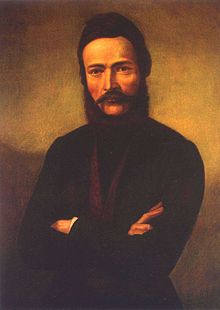Ľudovít Štúr
| Ľudovít Štúr | |
|---|---|

Portrait by Jozef Božetech Klemens
|
|
| Born |
28 October 1815 Uhrovec (Zayugróc), nearby Bánovce nad Bebravou (Bán), Austrian Empire, (now Slovakia) |
| Died | 12 January 1856 (aged 40) Modra (Modor), Austrian Empire, (now Slovakia) |
| Nationality | Slovak |
| Literary movement | Romanticism |
|
|
|
| Signature | |
Ľudovít Velislav Štúr (Slovak pronunciation: [ˈʎudoviːt ˈʃtuːr]; Hungarian: Stur Lajos; 28 October 1815, Uhrovec (Zayugróc), near Bánovce nad Bebravou (Bán) – 12 January 1856, Modra (Modor)), known in his era as Ludevít Štúr, was the leader of the Slovak national revival in the 19th century, and the author of the Slovak language standard, eventually leading to the contemporary Slovak literary language. Štúr was an organizer of the Slovak volunteer campaigns during the Hungarian Revolution of 1848. He was also a politician, poet, journalist, publisher, teacher, philosopher, linguist and member of the Hungarian Parliament.
At the turn of the 18th and 19th centuries, Slovaks were divided concerning the literary language to be used:
This situation did not change until the 1840s, when Ľudovít Štúr became the chief figure of the Slovak national movement.
At the same time, modern nations started to develop in Europe and in the Kingdom of Hungary. The Hungarians favoured the idea of a centralized state, although the Magyar population was only some 40% of the population of the Hungarian Kingdom in the 1780s. This was unacceptable to other national groups, including the Slovaks, and they expressed their disapproval.
In the 1830s, a new generation of Slovaks began to make themselves heard. They had grown up under the influence of the national movement at the prestigious Lutheran Lýceum (preparatory high school and college) in Bratislava, where the Czech-Slav Society (also called the "Society for the Czechoslovak Language and Literature") had been founded in 1829. Initially, the society operated in accordance with the ideas of Ján Kollár, a Protestant minister, poet, and academic, supporter of Czech-Slovak unity, and of the users of the language of Bible of Kralice. In the latter part of the decade, when Ľudovít Štúr came to the fore, its activities intensified. The most prominent representatives of the new generation were, along with Ľudovít Štúr, Jozef Miloslav Hurban (1817–1888) and Michal Miloslav Hodža (1811–1870).
...
Wikipedia
